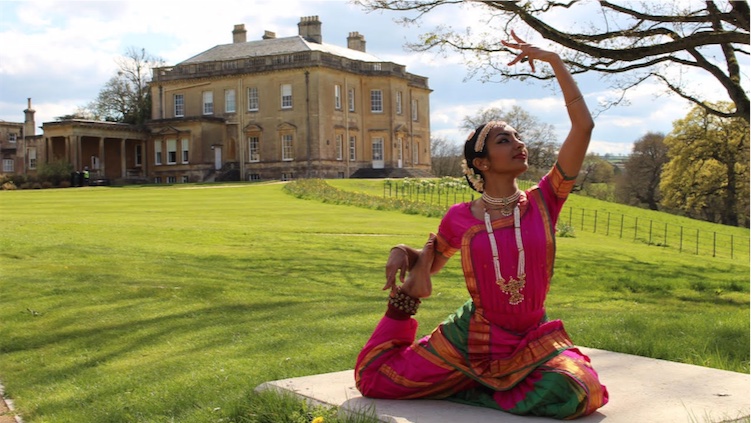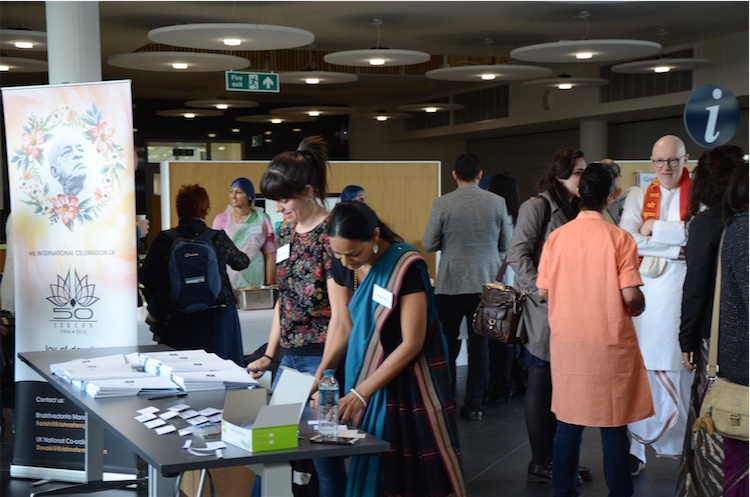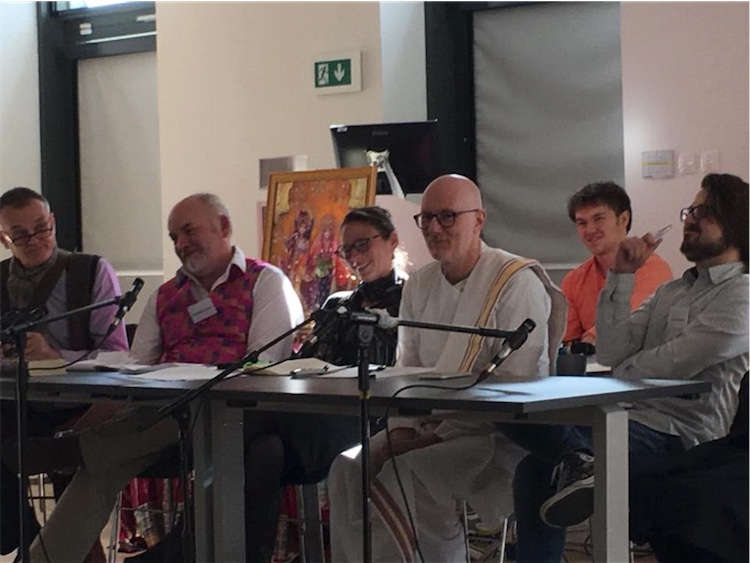Academic Conference at Bath Spa University, UK
By Zayani Bhatt | Апр 29, 2016

“My Sweet Lord: The Hare Krishna Movement Turns Fifty”
As a part of ISKCON’s 50th year celebrations, devotees from Bhaktivedanta Manor, academics from around the country and students from Bath Spa University gathered at the picturesque and quaint university on Saturday 23rd April to talk about their shared interest in the Hare Krishna movement. The day, organised in collaboration with Religions, Philosophies and Ethics at the University, was dedicated to talks, presentations and a panel discussion on the history of ISKCON including its greatest achievements and challenges, its position within the larger British Hindu community and its future and the potential challenges it may experience going forward into the next fifty years.
The academics included Dr Dermott Killingley who used to be of Newcastle University and Professor Kim Knott of Lancaster University, both of whom have extensively studied the Holy Scriptures such as the Bhagavat Gita, and the theology and practice of Srila Prabhupada’s movement.

Professor Kim Knott conducted her PhD on ISKCON, which enabled her to spend a week at the temple and experience and enjoy the practical aspects of Krishna conscious life such as garland making and the 4am aarti. She spoke openly and positively about ISKCON’s development within the UK: from engagement with the Beatles to enter the awareness of the British public, to the arduous struggle with local government over planning permission, to the establishment of education with the Krishna Avanti schools and the College of Vedic Studies. Professor Knott also noted that despite the various conceptions the public has had, over the years with the identity of the movement; from the Indian-isation of it given the mostly white disciples of Prabhupada, to its Hindu-isation in order to fit into the British Indian society, it has retained its theological philosophy whilst trying to engage with and serve the wider Hindu community.
Dr Killingley, one of the country’s most advanced Sanskrit speakers and a senior associate researcher at University of Oxford’s Centre for Hindu Studies, spoke at length about the history of ISKCON within the Vaishnava tradition as a whole. There is often debate about whether Krishna Consciousness is a new religion or not and Dr Killingley explained, that, the movement began fifty years ago by Srila Prabupada is a new version of a much older practice of Gaudiya Vaishnavism started in Bengal by Lord Chaitanya. This, in turn was a new version of a much older custom. In a wonderfully clear and succinct manner, Dr Killingley also explained bhakti, the different loving relationships one may have with God and the concept of Krishna Lila.

Rasamandala Das gave a presentation on the education ISKCON provides and the aims of this education, including further propagation of Krishna Consciousness in the future. As a devotee, he proposed that education, along with ethics are key areas for ISKCON, both looking inwards, especially at training for leadership roles and in engaging with the wider western world. The academics, Gauri Das, Rasamandala Das and Dr Suzanne Newcombe, a research officer at INFORM (Information Network on Religious Movements) engaged in a panel discussion about their first encounter with ISKCON, whether it can be considered a new religious movement and the future challenges ISKCON might face such as environmental issues and its stance on transgender.
Conference goers were also treated to a demonstration of aarti with its meaning and spiritual purpose, a short skit by the Bhaktivedanta Players, a traditional Bharatnatyam dance and a rousing musical rendition of the mahamantra. The essence of the day as explained by Devaki Dasi, the ISKCON 50 UK National Coordinator was that “there were people from all walks of life and every single one of them was interested in the Hare Krishna movement. There was a deep appreciation of our society.” Ultimately for the devotees however, it was a learning experience. In the words of guest His Grace Vraja Bihari das Brahmachari from Mumbai, “we are here to learn. Often when we are spiritual, we miss the world around us. By engaging with academics, we have a great opportunity to see and hear, from the benches, how far we have come. It helps us to better engage with others and improve.”















